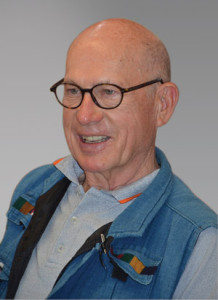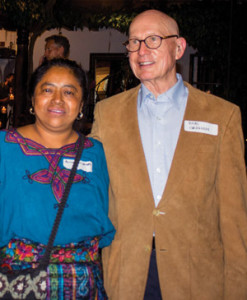La Antigua Resident Bob Graham’s Commitment to Economic Justice
In 1973 Bob Graham visited Guatemala on a Kellogg Foundation Fellowship. He was struck by the tragic circumstances endured by so many Guatemalans, especially rural Mayas. He promised himself that one day if he could, he would help people in similar situations with both resources and money.
 Bob grew up in a middle class Midwestern family in the U.S. After time in the U.S. Marine Corps and college, he worked in accounting and agriculture in Northern California. By 1986 Bob was restless and wanted more meaning in his work.
Bob grew up in a middle class Midwestern family in the U.S. After time in the U.S. Marine Corps and college, he worked in accounting and agriculture in Northern California. By 1986 Bob was restless and wanted more meaning in his work.
He made a radical plan to put 50 percent of his money and 50 percent of his time into philanthropic ventures at the age of 50. He called his plan “50-50 at 50,” and later he wrote a book chronicling his adventures.
He also created a family foundation named Namaste, a word honoring the spiritual traditions that Bob studied in India. Namaste means “I bow to the light in you.” Bob’s main goal was to bring out the light in each person who sought help.
The first memory of Central America never left Bob and he set out to focus his efforts on this region. He was the founding pioneer of one of Central America’s first microloan NGOs, the Katalysis Partnership, which received early support from USAID.
In 2004 when Bob turned Katalysis over to its regional not-for-profit partners, his microfinance work encompassed 21 NGOs in five countries with more than 200,000 borrowers and a loan portfolio of $60 million. Although most of Bob’s microfinance work has been focused on Central America, he also has contributed time and money to the Eastern Caribbean, Mexico, India and Africa during the last 30 years.
Over time Bob concluded that for microfinance to work best as a tool to alleviate poverty, education and mentoring on how to use the money was more effective than just loaning money. This conviction led to Bob’s most recent philanthropic venture in La Antigua Guatemala, Fundación Namaste, which offers a program of business development services (financial education, mentoring and microloans) to Guatemalan businesswomen who often earn less than minimum wages when they enter the program.
Successful program graduates on average increase their income by 117 percent to help make their business dreams come true. The women’s families also benefit greatly from the increased earnings, as the extra money is spent on better nutrition, health, housing and more schooling for the children. To date, Namaste has worked with over 2,300 women.
In January 2016 Bob celebrated his 80th birthday—with no signs of slowing down. When you spend time with Bob you can still feel the impatience to achieve results quicker that will meaningfully help more people become financially sustainable.
Q & A with Bob Graham
Why is working in Guatemala important to you?
Because the people are strong and resilient in the face of oppression, malnutrition, poor quality education and health care, polluted drinking water, astounding corruption, and unthinkable violence. Yet Guatemala is ranked in the top 10 happiest countries of the world. That surely means that despite everything, the people are determined, optimistic, and open to help. My dream is that each woman who finishes an education with Namaste feels solid about her financial abilities. It can be done.
How can impactful positive change happen?
The only way Guatemala is ever going to be the country it deserves to be is when its women stand up and say, ‘I am going to do something to help myself.’ I hope to provide those opportunities with Namaste. First they have to believe in the possibilities. We tell our women clients that they are worthy of a financial education, and that they are bright and capable of changing their future. If they believe that, we can help them.
There are hundreds of NGOs already supporting Guatemala. What needs to happen to have a better impact?
We need to figure out which NGO models are really making a positive difference, support them and scale them to more areas. To determine who is worthy of support means that NGOs need to measure the outcomes of their work at the level of positive change in the lives of the people being helped. That is how to measure success, not just by looking at money raised or number of staff.
What is the future for Fundación Namaste?
My long-term vision is that Namaste will be able to stand on its own two feet without me. Like another NGO I started, my dream is to turn the organization completely over to local hands. Namaste will become a sustainable NGO run by Guatemalans for Guatemalans.
Online info: namastedirect.org
facebook.com/NamasteDirect
REVUE article by by Maria Westfried
